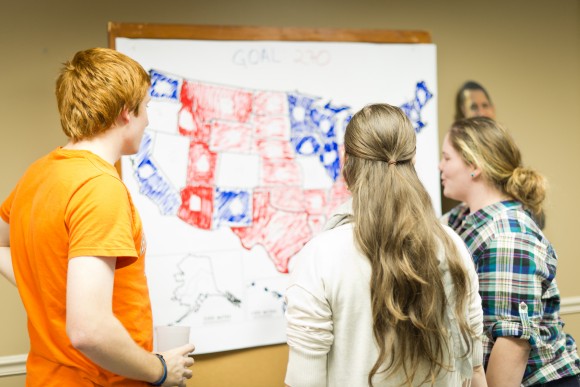Obama wins re-election, says “best is yet to come”

Students track the election in the College Union Building. For more photos from election night, check out The Gettysburgian’s Facebook page.
By Brendan Raleigh, Staff Writer
As President Barack Obama won the battleground state of Ohio on Tuesday night, he was pushed over the 270-electoral vote threshold set by the Electoral College, securing his reelection after months of arduous campaigning, fundraising, rallying and electioneering.
By the end of the night, Obama had managed to earn 303 electoral votes versus Mitt Romney’s 206, largely due to his consistent victories in the major battleground states, including Ohio, Virginia and Pennsylvania. Obama also won the popular vote by nearly a 3 million-vote margin.
The state of Florida, which was expected to be one of the two decisive states, remains too close to call, although Obama appears to be leading in the Sunshine State by less than one percentage-point. Regardless of which way the state swings, Obama has already won the race decisively.

A ballot stub sits on a student’s computer. For more photos, check out The Gettysburgian’s Facebook page.
Following his Ohio victory, Obama addressed thousands of ecstatic supporters in triumph, thanking those who had made his reelection possible and promising “the best is yet to come” for the United States.
An hour later, Romney delivered his concession speech (in spite of his earlier claim that he had only written a victory speech). He congratulated the president and his supporters on the election’s outcome before expressing both his desire for bipartisanship in politics and a relatively optimistic outlook on the country’s future.
Romney had made significant gains in the weeks preceding the election as a result of his stellar performance in the first presidential debate; unfortunately for the former governor, however, these gains were not enough to sway the election in his favor.
Gettysburg students were able to watch the election live from The Bullet Hole, the Common’s Café and The Junction. A majority of those present appeared to favor Barack Obama, consistently citing his positions on women’s rights as the deciding factors in their decision.
Conor Brooks, the President of Gettysburg’s College Democrats, explained his vote, saying, “I supported Barack Obama in this election. To me, the most important issues included all the social issues as well as the environment. In addition, his handling of the economy really impressed me.”
On the other hand, Sean Moran, the President of the College Republicans, chose not to vote for either of the two major party candidates, opting instead for Gary Johnson, the Libertarian nominee.
“I voted for Gary Johnson because I believe that Mitt Romney was not conservative enough for me,” Moran said. “I believe that Mitt Romney and Barack Obama’s budgets do not fully address our fiscal concerns, and both have not addressed my concerns for warrant-less wiretapping, the Federal Reserve, etc.”
In spite of the meager support to be found for Romney among college students, many did find his campaign to be more effective and better organized than the president’s.

A student supports candidate Mitt Romney as he watches the election results come in. For more Election Day photos, check out The Gettysburgian’s Facebook page.
First-year Audrey Bowler, an Obama supporter, said, “I tend to think that Romney’s campaign was run more effectively, especially towards the end. I think Obama’s campaign was a little slower to pick up momentum, but I don’t think he could have duplicated the momentum he had in 2008.”
Given the statistics provided by various polling websites, one would have expected the public to believe the election was a toss-up before the results came in. Rassmussen and Gallup, for example, both maintained a one-point lead for Governor Romney up until Tuesday, while other sites held ties or equally slim victories for Obama. In spite of the neck-and-neck nature of the race, Americans were far more confident in Barack Obama’s ability to win the election, giving him a 22-point advantage in an August Gallup poll.
The results of the election elicited screams of terror and frustration, squeals of joy and sighs of relief, as well as a number of other quiet-hours violations from those watching in the dorms. However, Gettysburg students did not appear to be surprised at the results of the election.
“The Republican Party did not nominate a candidate that was principled enough to stand as a true conservative,” Moran said. “He failed to provide a true contrast to Obama. It is no wonder that Obama won; America tends to reelect Presidents, and Romney was not nearly dynamic enough to change the hearts of American voters.”
Though the election is essentially over, this obviously does not mean the end of partisan disputes and political pandering until the next election cycle. Obama will still face opposition from the Republican-controlled House, pundits will still argue endlessly about every issue and the American people will remain divided on whether the results of this election will work for or against the well-being of the country.
